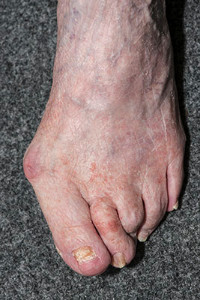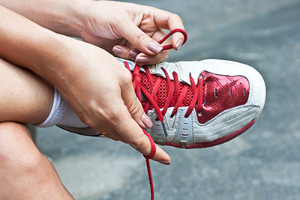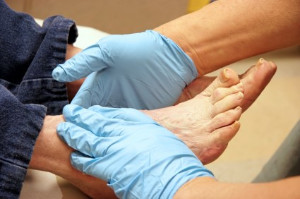Heel Pain in Children
 With warmer weather now upon us, many children make a return to outdoor sports and activities. Many parents may eventually face the issue of their children experiencing heel pain. In adolescents, heel pain is often caused by Sever’s disease. Pain is typically described as being at the back of the heel; this is where the growth plate has not fully developed yet. Sever’s disease is thought to occur because of a mismatch in the growth of the heel bones to the calf muscle and Achilles tendon. Rest and pain relief are key parts of treatment.
With warmer weather now upon us, many children make a return to outdoor sports and activities. Many parents may eventually face the issue of their children experiencing heel pain. In adolescents, heel pain is often caused by Sever’s disease. Pain is typically described as being at the back of the heel; this is where the growth plate has not fully developed yet. Sever’s disease is thought to occur because of a mismatch in the growth of the heel bones to the calf muscle and Achilles tendon. Rest and pain relief are key parts of treatment.
Making sure that your children maintain good foot health is very important as they grow. If you have any questions, contact Dr. Steven Shlonsky of Louisville, Kentucky. Dr. Shlonsky can provide the care you need to keep you pain-free and on your feet.
Keeping Children's Feet Healthy
Having healthy feet during childhood can help prevent medical problems later in life, namely in the back and legs. As children grow, their feet require different types of care. Here are some things to consider...
Although babies do not walk yet, it is still very important to take care of their feet.
Avoid putting tight shoes or socks on his or her feet.
Allow the baby to stretch and kick his or her feet to feel comfortable.
As a toddler, kids are now on the move and begin to develop differently. At this age, toddlers are getting a feel for walking, so don’t be alarmed if your toddler is unsteady or ‘walks funny’.
As your child gets older, it is important to teach them how to take care of their feet.
Show them proper hygiene to prevent infections such as fungus.
Be watchful for any pain or injury.
Have all injuries checked by a doctor as soon as possible.
Comfortable, protective shoes should always be worn, especially at play.
If you have any questions please feel free to contact our office located in Louisville, KY . We offer the newest diagnostic and treatment technologies for all your foot and ankle needs.
Managing bunions
 Regardless of the season, bunions and the pain associated with them plague athletes of all fields. Skiers, hockey players, basketball players, and other athletes involved in running sports are all susceptible to developing the condition. A bunion is characterized as a painful swelling of soft tissue and bone enlargement over the inner side of the ball of the big toe joint. With progression, the condition can become arthritic and may be accompanied by pain and the inability to wear shoes and walk comfortably. Treatment for bunions depends on the severity of the condition. In many cases, orthotics and wider fitting shoes can help, whereas more severe cases may call for surgery.
Regardless of the season, bunions and the pain associated with them plague athletes of all fields. Skiers, hockey players, basketball players, and other athletes involved in running sports are all susceptible to developing the condition. A bunion is characterized as a painful swelling of soft tissue and bone enlargement over the inner side of the ball of the big toe joint. With progression, the condition can become arthritic and may be accompanied by pain and the inability to wear shoes and walk comfortably. Treatment for bunions depends on the severity of the condition. In many cases, orthotics and wider fitting shoes can help, whereas more severe cases may call for surgery.
If you are suffering from bunions, contact Dr. Steven Shlonsky of Louisville, Kentucky. Dr. Shlonsky can provide the care you need to keep you pain-free and on your feet.
What Is a Bunion?
A bunion is formed of swollen tissue or an enlargement of boney growth, usually located at the base joint of the toe that connects to the foot. The swelling occurs due to the bones in the big toe shifting inward, which impacts the other toes of the foot. This causes the area around the base of the big toe to become inflamed and painful.
Why Do Bunions Form?
Genetics – Susceptibility to bunions are often hereditary
Stress on the feet – Poorly fitted and uncomfortable footwear that places stress on feet, such as heels, can worsen existing bunions
How Are Bunions Diagnosed?
Doctors often perform two tests – blood tests and x-rays – when trying to diagnose bunions, especially in the early stages of development. Blood tests help determine if the foot pain is being caused by something else, such as arthritis, while x-rays provide a clear picture of your bone structure to your doctor.
How Are Bunions Treated?
- Refrain from wearing heels or similar shoes that cause discomfort
- Select wider shoes that can provide more comfort and reduce pain
- Anti-inflammatory and pain management drugs
- Orthotics or foot inserts
- Surgery
If you have any questions, please feel free to contact our office located in Louisville, KY . We offer the newest diagnostic and treatment technologies for all your foot care needs.
Pay attention to your shoes
 Whether or not your shoes fit properly could be the difference between having healthy feet and having to walk around in pain. There are around 100 different working parts in your feet with 25% of all the bones of your skeleton residing inside your slippers. That being said, it is no wonder that wearing good quality, well-fitted shoes is extremely important for good foot and overall health. There are a few tips to follow when you are shoe-shopping: make sure to get your feet measured (they change size over time!), walk around the shoe store a bit with your new pair on, and buy activity appropriate footwear. This last point is especially important for running. Just because you’re not jogging in high heels doesn’t mean you’re wearing the right shoes.
Whether or not your shoes fit properly could be the difference between having healthy feet and having to walk around in pain. There are around 100 different working parts in your feet with 25% of all the bones of your skeleton residing inside your slippers. That being said, it is no wonder that wearing good quality, well-fitted shoes is extremely important for good foot and overall health. There are a few tips to follow when you are shoe-shopping: make sure to get your feet measured (they change size over time!), walk around the shoe store a bit with your new pair on, and buy activity appropriate footwear. This last point is especially important for running. Just because you’re not jogging in high heels doesn’t mean you’re wearing the right shoes.
Finding a properly-fitting shoe is important in reducing injuries and preventing foot problems. For more information about treatment, contact Dr. Steven Shlonsky from Louisville, Kentucky. Dr. Shlonsky will treat your foot and ankle needs.
Proper Shoe Fitting
A common concern when it comes to foot health, having properly fitted shoes can help prevent injuries to the foot. Out feet affect our posture and gait, which in turn affects the biomechanics and overall bodily structure. With 33 joints, 26 bones, and over 100 ligaments, the potential for serious injury is much greater than one realizes. Although the feet cease growth in adulthood, they still change shape as they mature. Here are some factors to consider when it comes to investing in proper fitting shoes:
- Be sure the shoes fit correctly right away
- Ensure the ball of your foot fits comfortably in the widest portion of the shoes
- Even though they may look fashionable, improper fitting shoes can either create adverse conditions or exacerbate existing ones you may already have
- Walk along a carpeted surface to ensure the shoes comfortably fit during normal activity
Keeping in mind how shoes fit the biomechanics of your body, properly-fitting shoes are vitally important. Fortunately, it is not difficult to acquire footwear that fits correctly. Be sure to wear shoes that support the overall structure of your body. Do your feet a favor and invest in several pairs of well-fitted shoes today.
If you have any questions please feel free to contact our office located in Louisville, KY . We offer the newest diagnostic and treatment technologies for all your foot and ankle needs.
Preventing diabetic lesions
 For people who live with diabetes, footcare should be high on the list of concerns related to overall health. Due to constricted blood flow or nerve damage, diabetics need to take extra care to avoid potential foot and leg injuries. Walking barefoot is not typically a good idea, as you may not feel it when you step on something sharp. Proper inspection is also very important. Be sure to check your legs and feet for any kind of sores or lesions. Gone unnoticed or untreated, these wounds can quickly become infected and lead to very serious consequences like amputation. Along with daily personal inspection, make sure you have your feet checked often by a podiatrist.
For people who live with diabetes, footcare should be high on the list of concerns related to overall health. Due to constricted blood flow or nerve damage, diabetics need to take extra care to avoid potential foot and leg injuries. Walking barefoot is not typically a good idea, as you may not feel it when you step on something sharp. Proper inspection is also very important. Be sure to check your legs and feet for any kind of sores or lesions. Gone unnoticed or untreated, these wounds can quickly become infected and lead to very serious consequences like amputation. Along with daily personal inspection, make sure you have your feet checked often by a podiatrist.
Diabetic foot care is important in preventing foot ailments such as ulcers. If you are suffering from diabetes or have any other concerns about your feet, contact Dr. Steven Shlonsky from Louisville, Kentucky. Dr. Shlonsky can provide the care you need to keep you pain-free and on your feet.
Diabetic Foot Care
Diabetes affects millions of people every year. The condition can damage blood vessels in many parts of the body, especially the feet. Because of this, taking care of your feet is essential if you have diabetes, and having a podiatrist help monitor your foot health is highly recommended.
The Importance of Caring for Your Feet
- Routinely inspect your feet for bruises or sores.
- Wear socks that fit your feet comfortably.
- Wear comfortable shoes that provide adequate support.
Patients with diabetes should have their doctor monitor their blood levels, as blood sugar levels play such a huge role in diabetic care. Monitoring these levels on a regular basis is highly advised.
It is always best to inform your healthcare professional of any concerns you may have regarding your feet, especially for diabetic patients. Early treatment and routine foot examinations are keys to maintaining proper health, especially because severe complications can arise if proper treatment is not applied.
If you have any questions please feel free to contact our office located in Louisville, KY . We offer the newest diagnostic and treatment technologies for all your foot and ankle needs.







